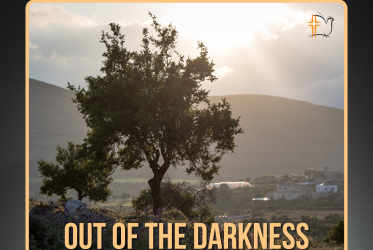While 50 people from eight countries were paying a solidarity visit to Jerusalem and the Occupied Palestinian Territories last week, related advocacy activities focusing on the situation in Israel and Palestine were taking place on five continents.
The 12-19 March visit and concurrent activities around the world were part of an International Church Action for Peace in Palestine and Israel advocacy initiative, convened by the World Council of Churches (WCC).
Launching the week at a worship service in Jerusalem, Latin Patriarch Michel Sabbah stated that freedom for the Palestinians and security for Israelis are not contradictory notions: "We address our appeal to both peoples: Israelis, in search of your security and permanent peace, we love you all. Palestinians, in search of your freedom and dignity, we love you all. Both of you are capable of loving each other. The language of violence has replaced so far, for too long a time, this language of love."
Other highlights of the week were a conference in London organized by the Middle East Forum of Churches Together in Britain and Ireland (CTBI) and Christian Aid, a seminar at the UN Church Center in New York, a worship service in Cape Town's St George's Cathedral, and a symposium on morally responsible investment in the Netherlands.
At the London conference, Dr Bishara Awad, principal of Bethlehem Bible College, Rev. Kamal Hanna Bathish, Latin patriarchate of Jerusalem, and Rev. Riah Abu el Assal, Anglican bishop in Jerusalem addressed a packed hall of UK church, civil society and government personnel, who listened to their hopes and fears, and promised to pray and act on their behalf. "This is not a one-off, but part of a strategy of awareness in our churches. I trust that those gathered here will not give up," Rev. Michael Langrish, bishop of Exeter said.
In the US, past "ecumenical accompaniers" addressed international, church and UN participants at the New York seminar. Israel-Palestine was also on the agenda of the Ecumenical Advocacy Days for Peace with Justice held in Washington DC, which brought together politicians, theologians and students from across the country.
Vivid close-ups
In Israel and the Occupied Palestinian Territories, the solidarity visitors' group met with church leaders, Christian communities and politicians. At the beginning of the week, they planted olive trees as a sign of hope, close to the separation wall in Bethlehem.
Their programme included a visit to the Aida refugee camp in Bethlehem - home to 5000 Palestinian refugees, and to a village close to Hebron which has experienced repeated attacks by Israeli settlers. The group also visited communities affected by the separation wall, and met people who have been battling to save their land from settlement expansion. To conclude the week, participants took part in a candlelit vigil for peace next to the separation wall at Qalandiya, close to Ramallah.
"The main impact was to see vividly the severe problems that Palestinians are facing each day," said Bob Tobin, a US member of the group. "Newcomers to the situation were in tears from what they saw. Members [of the group] who had visited previously were startled by how much negative change had taken place under the continuing occupation".
"Today we depart to the Netherlands with a sense of urgency and concern," noted the Dutch visitors. "What we have encountered here cannot be called other than catastrophic," the group said in a 20 March statement to their government, urging it "to take concrete and effective measures to protect the human dignity and the rights of the Palestinians, thereby contributing to the preconditions for a just peace".
"The protection of the rights of the Palestinians is a necessary precondition for peace. This can be done without negatively affecting the special relationships with Israel. To the contrary, an end of the injustice is also in the interest of the security and the existence of Israel," they also said.
Groups and organizations participating in the joint advocacy initiative included Joint Advocacy Initiative (JAI) of the East Jerusalem YMCA and the YWCA of Palestine, the Sabeel Center, South African Council of Churches (SACC), Pax Christi International, Churches for Middle East Peace (CMEP) (USA), the Middle East Forum of Churches Together in Britain and Ireland (CTBI) and Christian Aid (UK), and Work Group-Turning Point, Kirken in Actie and ICCO (Netherlands).
A free high resolution picture is available on the website.
A message for the week from the patriarchs and heads of churches in Jerusalem (in English and in French) is available on the WCC website at :
wcc-coe.org/wcc/what/international/palestine/06-02-06-jerusalem-patriarchs.html
wcc-coe.org/wcc/what/international/palestine/06-02-06-jerusalem-patriarchs-f.html
Website of the Ecumenical Accompaniment Programme in Palestine and Israel (EAPPI) :







